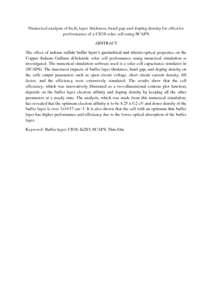Citation
Khoshsirat, Nima and Md Yunus, Nurul Amziah
(2016)
Numerical analysis of In2S3 layer thickness, band gap and doping density for effective performance of a CIGS solar cell using SCAPS.
Journal of Electronic Materials, 45 (11).
pp. 5721-5727.
ISSN 0361-5235; ESSN: 1543-186X
Abstract
The effect of indium sulfide buffer layer’s geometrical and electro-optical properties on the Copper–Indium–Gallium–diSelenide solar cell performance using numerical simulation is investigated. The numerical simulation software used is a solar cell capacitance simulator in (SCAPS). The innermost impacts of buffer layer thickness, band gap, and doping density on the cells output parameters such as open circuit voltage, short circuit current density, fill factor, and the efficiency were extensively simulated. The results show that the cell efficiency, which was innovatively illustrated as a two-dimensional contour plot function, depends on the buffer layer electron affinity and doping density by keeping all the other parameters at a steady state. The analysis, which was made from this numerical simulation, has revealed that the optimum electron affinity is to be 4.25 ± 0.2 eV and donor density of the buffer layer is over 1×1017 cm−3. It is also shown that the cell with an optimum thin buffer layer has higher performance and efficiency due to the lower optical absorption of the buffer layer.
Download File
![[img]](http://psasir.upm.edu.my/53400/1.hassmallThumbnailVersion/Numerical%20analysis%20of%20In2S3%20layer%20thickness%2C%20band%20gap%20and%20doping%20density%20for%20effective%20performance%20of%20a%20CIGS%20solar%20cell%20using%20SCAPS.pdf)  Preview |
|
PDF
Numerical analysis of In2S3 layer thickness, band gap and doping density for effective performance of a CIGS solar cell using SCAPS.pdf
Download (72kB)
| Preview
|
|
Additional Metadata
Actions (login required)
 |
View Item |

